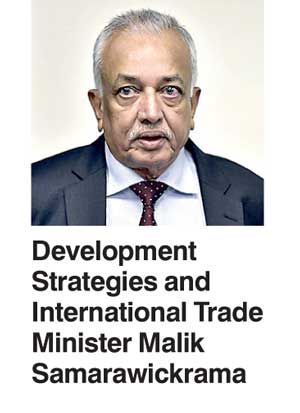Thursday Feb 19, 2026
Thursday Feb 19, 2026
Tuesday, 12 December 2017 00:53 - - {{hitsCtrl.values.hits}}
 Development Strategies and International Trade Minister Malik Samarawickrama moved several regulations and bills yesterday before Parliament adjourned until 23 January 2018.
Development Strategies and International Trade Minister Malik Samarawickrama moved several regulations and bills yesterday before Parliament adjourned until 23 January 2018.
Firstly, the regulations made by the Minister under Section 20 read with Subsection (3) of Section 4 and Section 14 of the Imports and Exports (Control) Act No. 1 of 1969 amended by acts No. 48 of 1985 and No. 28 of 1987 and published in the Gazette Extraordinary No. 2044/40 of 9 November 2017 was moved for lawmakers’ approval.
“Since 1969, Sri Lanka has been a signatory to the World Customs Organisation (WCO). Therefore, it is compulsory to implement the international convention to harmonise the commodity description and coding system. According to Article 3 of the said conventions, the Custom Tariffs and the statistical nominator tariffs conform to the harmonised system which will be reformed every four years, and the harmonised system 2012 amended as harmonised system 2017 accordingly.”
According to Minister Samarawickrama, the Customs Corporate Council recommended certain amendments to the existing harmonised codes at a six-digit level and introduced six amendments to the harmonised system 2012.
“It is adopted as a new version 2017 to ensure it keeps the harmonised system up to date with changes in the technology and patterns of international trade. The amendment covers the agricultural sector, chemicals sector, wood sector, textile sector, base metal sector, machinery sector, transport and a few other sectors. Accordingly, Sri Lanka made amendments to the harmonised system at an eight-digit level to comply with the obligations of the WCO. It is required to publish this order in the revenue protection order as per the article of the international convention on the harmonised commodity description and coding system,” he added.
Moving the Anti-Dumping and Countervailing Duties Bill and Safeguard Measures Bill, which are vital pieces of legislation to protect the domestic market from unfair trading practices, the Minister said: “While welcoming greater trade with the rest of the world, we haven’t forgotten to look after the interests of our own industries here at home. This is why the two bills presented today are so significant. I am pleased that our Government was able to present these bills which have been delayed for many years. These bills are the outcome of several consultative committee meetings previously held in Parliament, Cabinet decisions incorporating such decisions and the final drafting process. The Attorney General has confirmed that these bills are consistent with the Constitution.”
Sri Lanka is moving decisively towards a model that is driven by entrepreneurship, trade and investment, according to Minister Samarawickrama.
“Our Government has committed to creating one million new and better jobs for the youth of this country. The only way to do this is by becoming a more active participant in international trade. Sri Lanka is not new to this. We were a country where trade accounted for 80% of the GDP over a decade ago. Thereafter we slipped down and now it is half of that and has reached 40%. We are moving decisively towards a more dynamic trade regime whether it is the removal of para-tariffs or duty reduction through bilateral trade agreements. Some measures were introduced in the recent Budget where there was the removal of para-tariffs on 1,200 items with a roadmap for the removal of all para-tariffs within the next three years. Alongside this there will be substantial liberalisation coming through with free trade agreements as we are signing with Singapore, China and India,” he added.
Listing the benefits of the trade remedy measures introduced by the bills, the Minister stated that Sri Lanka was in the process of rationalising and phasing out Customs duties in relation to its previous FTAs.
“Instead of introducing trade remedy laws, Sri Lanka has resorted to introducing various para-tariffs. With the removal of these Customs duties on imports there has been a tendency with several trading partners to resort to dumping or subsidisation of their goods of different kinds into Sri Lanka. This creates, from time to time, unfair competition in the domestic market whereby the domestic industry may suffer injury. As a remedy to such issues these new laws will offer a great deal of significance,” he added. (AH)